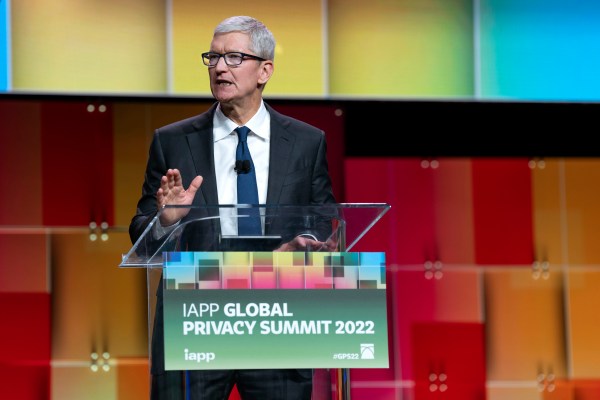Apple CEO Tim Cook has used a speech at the IAPP conference in Washington, D.C. today to frame looming competition reforms which could force the iPhone maker to allow sideloading of apps as a threat to privacy and security.
His remarks avoided mentioning any specific pieces of legislation but moves are afoot on both sides of the Atlantic that could force Apple to loosen control of the iOS user experience by forcing it to allow sideloading — such as the Open App Markets Act, introduced to the U.S. Senate last summer, or the European Union’s Digital Markets Act, which gained political agreement last month and will likely come into force later this year.
Ongoing litigation between Epic and Apple is also focused on App Store restrictions.
In the keynote speech this morning, Cook repeated a long standing claim that Apple believes privacy is “a fundamental human right” — hitting out once again at “a data industrial complex built on a foundation of surveillance” he said is working overtime to undermine web users’ privacy for its own commercial profit.
That’s why, said Cook, Apple has developed a series of features in recent years to help users counter commercial surveillance — and “have more control over their private information” — such as the App Tracking Transparency feature it added last year that requires apps to ask users for permission to track them, or an email address shielding feature Apple launched that makes it harder for third parties to link users’ web activity across different services.
But the Apple CEO soon sought to intertwine threats to user privacy — which he’d suggested are countered by giving users more controls to make tracking them harder — with the broader issue of security threats, such as posed by malware like ransomware — going on to argue that security as an overarching bolster for privacy isn’t helped by giving users more control over the choice of third-party software they can download.
On the contrary, Cook argued, giving users a choice to step outside the “rigorous security protections” he suggested Apple has baked into the App Store (via the app review process) — by letting iOS users sideload apps or even choose to use a non-Apple app store entirely — would ultimately reduce their control by removing a “more secure choice.”
“I fear that we could soon lose the ability to provide some of those protections,” he suggested, framing looming competition-focused regulations as a risk to both “our privacy and security.”
And while Cook said some of these regulatory reforms may be well intentioned, he sketched an overwhelmingly negative outcome for users — if “data-hungry companies would be able to avoid our privacy rules, and once again track our users against their will,” as a result of laws forcing Apple to open iPhones to apps that circumvent App Store review via sideloading.
Apple is “deeply concerned about regulations that would undermine privacy and security in service of some other aim,” he said — also suggesting sideloading would “potentially give bad actors a way around the comprehensive security protections we’ve put in place, putting them in direct contact with our users.”
Here he pointed to the example of bogus COVID tracing apps that infected some (non-iPhone) smartphone users’ devices with ransomware early in the pandemic by targeting people who “could install apps from websites that lack the App Store’s defenses,” as he framed it.
“Proponents of these regulations argue that no harm would be done by simply giving people a choice. But taking away a more secure option will leave users with less choice, not more,” he warned. “And when companies decide to leave the App Store because they want to exploit user data, it could put significant pressure on people to engage with alternate app stores. App stores where their privacy and security may not be protected.”
“We’ve long said that security is the foundation of privacy — because there is no privacy in a world where your private data can be stolen with impunity. Never before has this threat been more profound, or its consequences more visible,” Cook also argued.
He went on to make the point even more forcefully a little later in the speech — warning that forcing Apple to let unvetted apps onto iPhones “will” have “profound” unintended consequences.
“And when we see that, we feel an obligation to speak up — and to ask policymakers to work with us to advance goals that I truly believe we share, without undermining privacy in the process,” he added, saying Apple will continue to lobby on this issue and urging the privacy community attending the conference to join it and “make sure that regulations are crafted, interpreted, and implemented in a manner that protects people’s fundamental rights.”
Cook ended his speech by characterizing regulatory shifts in competition policy as “a pivotal moment in the battle for privacy.”
“Those of us who create technology and make the rules that govern it have a profound responsibility to the people we serve,” he added. “Let us embrace that responsibility. Let us protect our data and secure our digital world.”
The argument isn’t a new one for Apple; the company has repeatedly sought to counter policy moves to shrink its ability to control iOS by framing such proposals as a risk to security and, more widely, as downgrading a premium user experience.
However Apple’s app review process is hardly perfect and does not guarantee that iOS users are always protected from scams and fraud or even from malware inside the App Store. Similarly, Apple’s heavily marketed privacy features don’t give users perfect protection against tracking. The truth, as ever, is rather grayer.
So it doesn’t seem a huge leap to think that laws giving iOS users an option to sideload apps — should they choose to accept that risk — won’t mark the end of privacy and security on iOS either.
